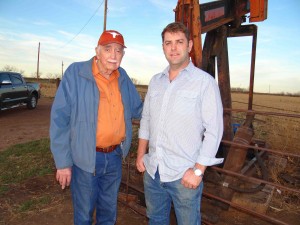by Lana Cunningham
From the era of cable tool rigs and the Model T Ford to today’s instant communication by cell phone and computers, Phil Kendrick, Jr., has worked through generations of changes in the petroleum industry. His father started Kendrick Oil & Gas Company in Abilene in 1918 and the son, at 86, continues to operate the business.
But regulations coming through cyberspace today from state government concern Kendrick that small operators like himself will be shut in.
“We have survived some bad times, but barely,” said Kendrick of his company’s longevity. “It always seems like the little guys get taken out during a downturn.” Although exploration in the Abilene area hasn’t hit a “sweet spot” as experienced by the Permian Basin, Kendrick noted his company has held steady throughout the years.
Recent changes coming out of the State Legislature and through the Texas Railroad Commission have translated into more paperwork, more money spent on consultants, lawyers, and engineers, and more delays. Plugging wells on the RRC’s timetable and keeping every drop of oil and salt water off the ground are additional issues that plague small operators, according to Kendrick.
“It’s hurting us. It’s hurting us bad,” he said.
“Every barrel of oil we sell has an ad valorem tax on it. That money is supposed to be spent on plugging wells. Then the State Legislature said it didn’t have any money and started taking that ad valorem tax money. They told the RRC it had to raise its money [to operate] from fines and fees.”
With the increased amount of work going on in the oil patch, the RRC admittedly is understaffed to quickly handle the paperwork coming in to its office. “There are all kinds of delays in getting permits,” Kendrick said. “I’ve had an application for an injection permit in there for 90 days. That’s after we had to spend two months gathering information they now require under new rules. I had to hire a consultant to do that work.”
Rule changes are causing other problems, according to Kendrick, who has worked in the oil fields around Abilene since he was 6 years old and helped his dad on the leases. That area, he pointed out, is known for its shallow wells while the Permian Basin has a reputation for deep wells.
“Rule 13 is a horror story,” Kendrick said, referring to this regulation that stipulates casing, cementing, drilling, and completion requirements. “If you want to waterflood a shallow field, unless the well has been plugged under the new rules, you can’t use secondary recovery.”
Back in the days when oil dropped to $8 a barrel, operators were walking away from low volume wells. “The attitude of the Legislature then was for us to not plug the well if it had any chance of making money in the future. They wanted to keep stripper wells alive in case of a national emergency. We could keep it unplugged if there was no oil on the ground. There are millions of barrels of recoverable oil but the RRC now wants us to plug the wells. We can’t keep them for secondary recovery.”
Rules allow operators 90 days to plug a well and Kendrick says there are no time extensions. “There is a shortage of plugging rigs and the Railroad Commission is also using them.”
Operators are required to build a 2 ½- to 3-foot berm around a tank battery “so anything overflowing won’t go down the road and into fresh water. There cannot be any sign of oil or salt water outside that berm or they write you up,” said Kendrick, who recalled the days when ranchers wanted operators to put oil on their ranch roads to limit blowing dust. Any oil or salt water crystals found outside the berm now requires the operator to remove the soil and remediate the area. “Anytime I have a crew go out there and do that job it costs me a minimum of $3,000 to $4,000.”
Failure to follow the rules results in a fine, said Kendrick. And if he wants to appeal a fine, he has to pay $4,500 for the RRC to hold the hearing. “They get all their experts at the hearing. I don’t have a chance unless I hire a really good lawyer and engineer. The Exxons of this world have huge staffs to take care of the $4,500 and it’s not a big deal to them. But it is to me.”
It’s a lot of money for someone who recalls the days of cable tool drilling rigs and oiled roads.
—Lana Cunningham











